- 28 March 2015
- From the section Asia
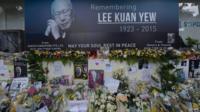
Lee Kuan Yew is hugely respected in the region Singapore is preparing to bid farewell to its founding father Lee Kuan Yew, who died on Monday aged 91.
Mr Lee's coffin will be carried in a procession across the streets of Singapore, and taken to a state funeral attended by world leaders.
The statesman's body will then be cremated in a private family ceremony.
Over the past week, more than one million people have visited tribute sites across Singapore to pay their respects to Mr Lee, local media report.
More than 415,000 people, or 12% of Singaporean citizens, visited Parliament House to see Mr Lee as he lay in state, while at least 850,000 others went to community sites to pay tribute.
The funeral procession will begin on Sunday at 12:30 local time (04:30 GMT), with Mr Lee's coffin carried through central Singapore to the University Cultural Centre at the National University of Singapore.
The funeral service is expected to begin at 14:00, with foreign leaders including former US President Bill Clinton, Indian Prime Minister Narendra Modi, Indonesian President Joko Widodo, Japanese Prime Minister Shinzo Abe, Australian Prime Minister Tony Abbott and UK House of Commons leader William Hague attending.
The country will also observe a minute's silence in the afternoon.
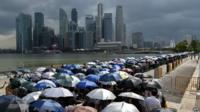
Hundreds of thousands have queued to pay their respects at Parliament House Current Prime Minister Lee Hsien Loong, who is Lee Kuan Yew's son, has described the past week's tributes to his father as "extraordinary, deeply moving", and "a tremendous unique experience for Singaporeans".
Many of the city-state's shopping and commercial centres are expected to be closed on Sunday as a mark of respect to Mr Lee.
Analysis: Jonathan Head, BBC South East Asia correspondent
This orderly and usually unemotional city has over the week built up to a crescendo of commemoration for the man they are now calling the father of Singapore.
People queued for many hours to see Lee Kuan Yew's body lying in state, or to sign condolence books. A huge official publicity campaign has celebrated his achievements in building Singapore; special classes about his life are now mandatory in schools.
Only a few dissident voices have criticised what they say is akin to a personality cult, pointing out that the authoritarian Mr Lee had his dark sides too.
Once the funeral is over, Singaporeans will have to start thinking about what direction their country should take, now they no longer have the outsize personality who has dominated their country since independence.
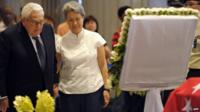
Former US Secretary of State Henry Kissinger, accompanied here by Lee Hsieng Loong's wife Ho Ching, is in Singapore to pay his respects
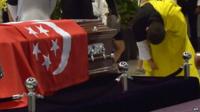
Bhutan's King Jigme Khesar Namgyel Wangchuck paid tribute to Mr Lee at Parliament House Mr Lee was Singapore's prime minister for 31 years, stepping down in 1990.
He oversaw Singapore's independence from Britain and separation from Malaysia, and was widely respected as the architect of Singapore's prosperity - the city-state's GNP per capita increased 15-fold between 1960 and 1980.
However, Mr Lee also introduced tight controls. Under him, freedom of speech and the press was tightly restricted and political opponents were targeted by the courts.
Speaking about his legacy to the New York Times in 2010, Mr Lee said: "I'm not saying that everything I did was right, but everything I did was for an honourable purpose."








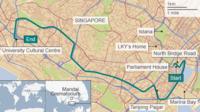



 Reply With Quote
Reply With Quote


Social Networking Bookmarks